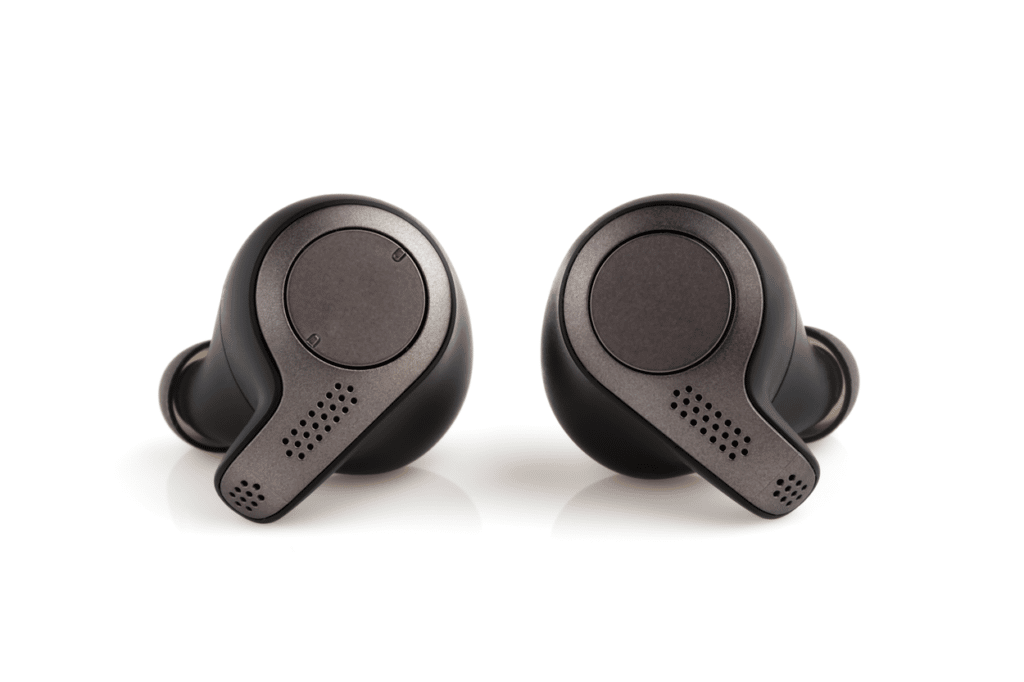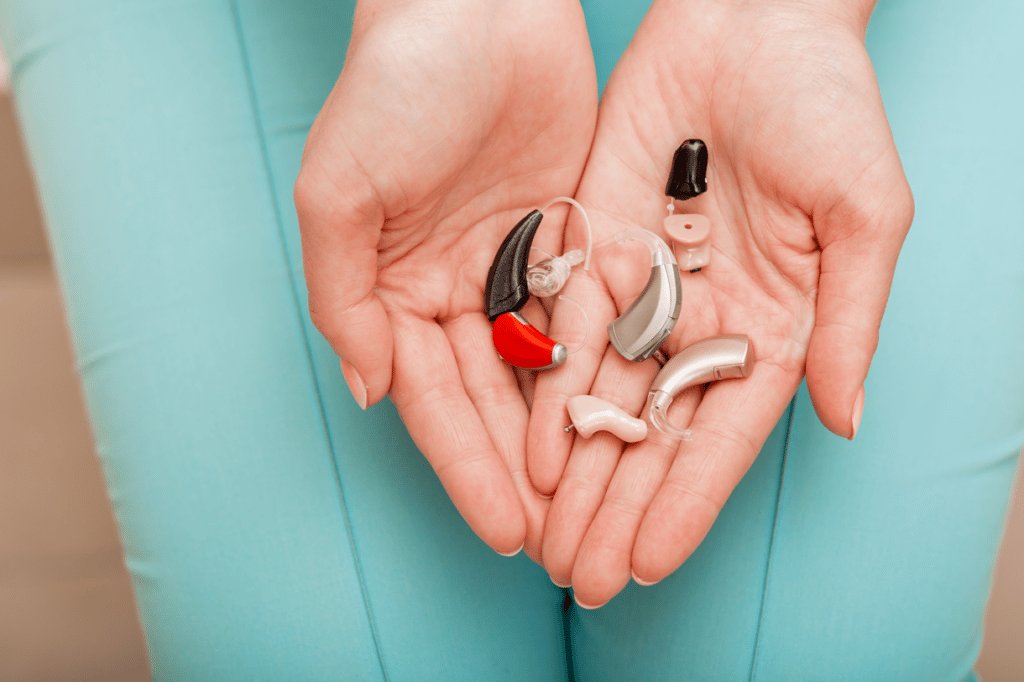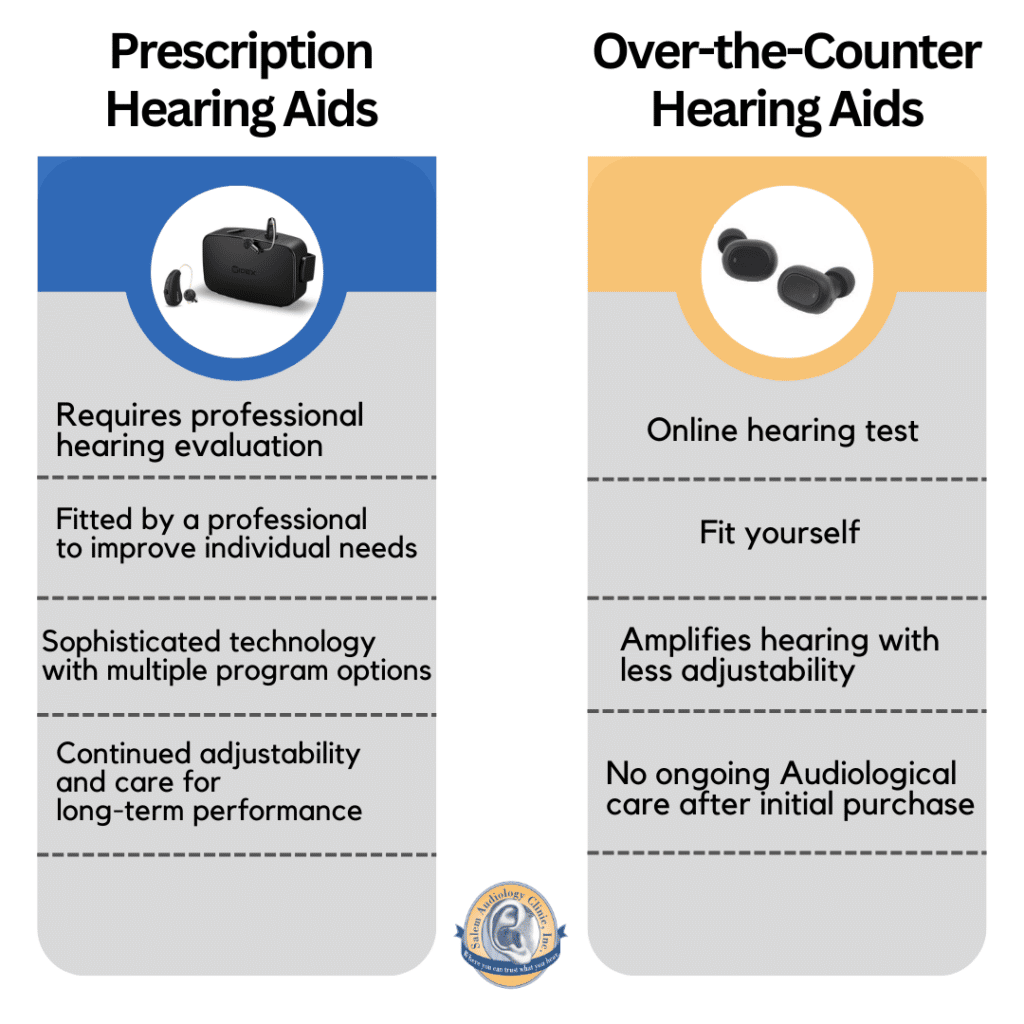
Until recently, the only way to obtain hearing aids was to have your hearing tested by an audiologist, then have them match your hearing loss to a set of hearing aids.
Now you can head to your nearest electronic or “big box” store and purchase off-the-shelf or Over-the-counter (OTC) hearing aids and be on your way, right?
Although technological advancements have made this new wave of hearing aids possible to “grab and go,” you should consider a few things before purchasing OTC hearing aids to ensure they are the right fit for you and your lifestyle.
Cost of OTC hearing aids v.s traditional hearing aids.
The price has always been among the most significant barriers to entry for many hearing aid wearers. OTC hearing aids are expected to range between $600 and $3,000 per pair. Currently, the average pair of hearing aids is $4,200.
From a cost standpoint, there is a clear benefit to saving such a large amount of money. However, one primary consideration is the service and support you miss out on from an audiologist. For some, an off-the-shelf option will be just fine, with minimal programming and adjustments, but specific fine-tuning and ongoing adjustment needs for others.

Service and Support
One of the most significant advantages of getting your hearing aids professionally fitted is the continued support you receive from a certified hearing care specialist. As we age, as our eyesight changes, so does our hearing. When a person is initially fit with traditional hearing aids, it may take them a few weeks or even months to get used to the devices. Also, while doing so, they may need to make several return visits to adjust their instruments. Consequently, they can experience sounds that are manageable and low at a time. It can be a staggering difference from missing certain sounds to hearing everything. Many hearing care professionals will program a patient’s hearing aids to a slightly lower volume and turn them up over time, so the patient isn’t overwhelmed.
Design
From what we know, over-the-counter hearing aids will be a “one-size-fits-most” (OSFM) design, along with limited styles. It’s important to consider because not everyone has the same size or shape ear. Depending on your lifestyle, an OSFM may not be your best option.
Traditional hearing aids come in several varieties, with the most common including:
- Behind-the-ear (BTE)
- In-the-canal (ITC)
- In-the-ear (ITE)
- Receiver-in-canal (RIC)
Each of these has its advantages and disadvantages, but overall there is a fit for everyone. It is still unknown if OTC aids will offer multiple fitting options. So those looking to “grab and go” will have to be ok with the OSFM option.
Who should and should not purchase OTC hearing aids?
Now that we have discussed some essential areas to note on the difference between traditional and OTC aids. It’s vital to discuss whom these devices are intended for and who should shy away and go the conventional route.
OTC hearing aids were developed for adults with self-perceived mild-to-moderate hearing loss. The FDA says the purpose is to increase competition in the hearing aid market and ultimately make them more affordable.
Children and those with moderate to profound hearing loss will remain prescription devices for hearing aids.

Am I a prospect for OTC hearing aids?
OTC hearing aids are intended to help those with mild to moderate hearing loss or for situational use, such as being in a place of worship, a restaurant, or watching TV.
Because it’s up to the user to be a bit “tech-savvy.” If updating your phone’s software or downloading apps is comfortable for you, handling self-fitting hearing aids will likely be manageable.

Who is not a good candidate for OTC hearing aids?
OTC may not be a good choice for you if you experience difficulties having a conversation in quiet environments, trouble hearing loud sounds, such as cars honking while driving, or your hearing loss is more severe than OTC hearing aids can handle.
You need to find a doctor quickly if you have sudden hearing loss. A sudden decline in your hearing (even if it improves), a considerable difference between hearing in the ears, or tinnitus (ringing) in only one ear are all possible signs of a medical condition.
What to keep in mind when buying an OTC hearing aid
According to the Hearing Loss Association of America (HLAA), below are a few questions you will want to ask before purchasing an off-the-shelf hearing device.
- How long is the battery life?
- How do you customize the hearing aids? For example, via a smartphone app.
- How much customization is capable?
- Can you adjust the hearing settings on the go?
- Does it have a telecoil or Bluetooth?
- Can you return the hearing aids? Is there a free trial period? Payment plan?
If you decide to purchase OTC hearing aids and it doesn’t work out, it’s essential to know the return policy. Furthermore, is there any person you can contact for additional assistance or questions? Some manufacturers have a phone number you can call or other choices for support. It’s good to know your options should you need them.
Putting it all together
Hearing aids have a multitude of health benefits. Regardless of your choice, either OTC hearing aids or seek prescription hearing aids from a hearing aid clinic near you, it’s a vital first step in your hearing health journey. When worn correctly, hearing aids have shown improved health benefits. Not only will you hear better, but you’re also allowing your brain to avoid future auditory deprivation and possibly even dementia.
Salem Audiology Clinic can help answer your questions and help you determine which type of hearing aid is right for you. Call us and schedule your consultation today, and take your first step towards better hearing and more vibrant life.
